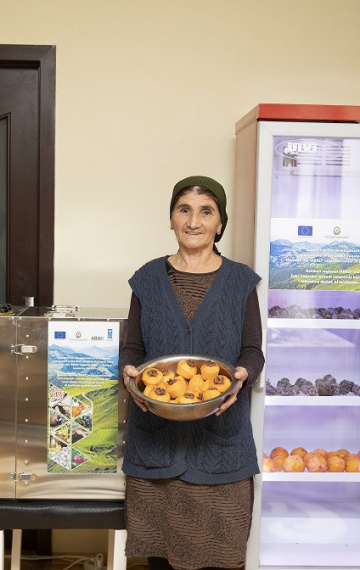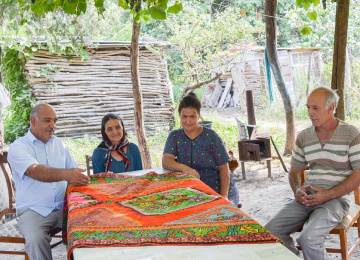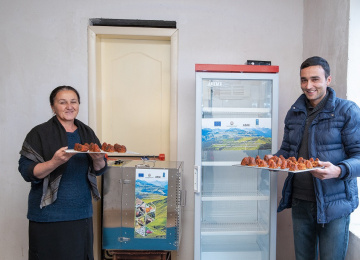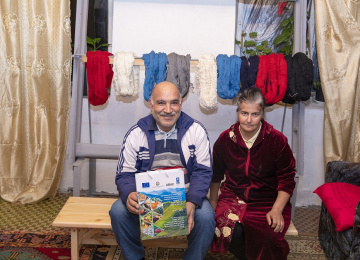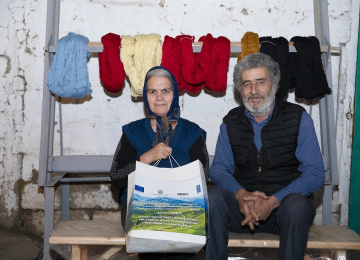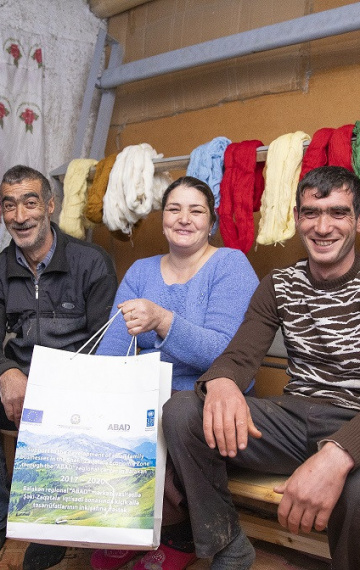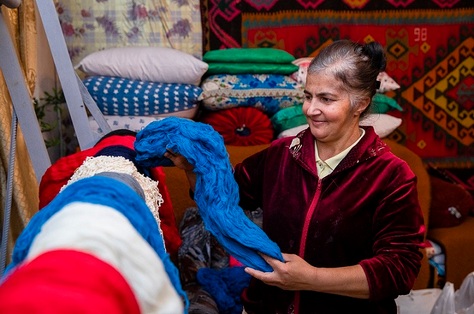
The majority of households in north-west Azerbaijan live in rural and often remote mountainous areas with limited employment opportunities. The diverse population of the six north-western regions that comprise the Shaki-Zaqatala Economic Zone also includes many vulnerable families displaced by conflict.
The Agalarov family, for example, fled to Shaki-Zaqatala from the Nagorno-Karabakh conflict. ‘When we first arrived here we had nothing except our carpets and books,’ says Zamina Agalarova. ‘We struggled to make a living. Even when you have skills it’s difficult to find a job, let alone start your own business. But we are determined to preserve our weaving skills and designs.’
Carpets are highly valued in Azerbaijan and each region boasts its own traditions and techniques of carpet-weaving, wool-dyeing and symbolic designs. The traditional carpets of the region from which the Agalarovs originate are amongst the rarest in the world and rarely seen outside of museums. The Agalarovs are one of twelve families of internally displaced persons from the north-west region whose lives are being transformed by a new EU funded project providing entrepreneurial training to help people set up small family businesses. ‘The training course included thirteen sessions,' explains Zamina, ‘and we learnt a lot about how to develop a business plan and how to develop a brand, as well as the rules for selling over the internet and packaging. It gave us the confidence to start our own family business, though we’re still learning every day, and a lot of the course has only really started to make sense in practice.’
‘The crucial thing to start things off was obviously the loom and all the threads,’ explains Zamina, ‘but what’s even more exciting for us is the new training we’re getting in how to use technology to improve our efficiency. While equipping themselves with the techniques they need to expand into a higher value market, the Agalarovs family are already putting their business skills to good purpose – creating beautiful souvenir carpets that are more cost-effective to produce and easier to sell on the market.'‘We’re not just making a living for our family but keeping the carpet weaving art alive among the community,’ says Zamina, ‘Right now, for example, we’re teaching the craft to the three other girls from internally displaced families’.
The project to support the establishment of small business in north-west Azerbaijan is part of the European Union’s EU4Business Initiative - Support to Rural and Regional Development (SRRD) and is implemented in cooperation with ABAD. ABAD, which means “easy” in Azerbaijani, is the country’s prominent national network for advancing family businesses. This cooperation greatly adds to the capacity of the project and helps ensure the sustainability of the new start-ups. On completing their current technical training, for example, the Agalarovs will become full members of ABAD (www.abad.gov.az), meaning they will be able to place and sell their products in ABAD’s large distribution network, which includes big supermarkets, hypermarkets and duty-free shops.
The project began in December 2017 and is already helping to empower 44 vulnerable families in the region. Overall about there will be 300 direct beneficiaries and up to 600 indirect beneficiaries of the project. Of the 44 start-ups so far initiated, 23 are led by women. A key priority in selecting which ventures to support has been the potential for small businessesto provide employment opportunities for others in the community. Additional key selection criteria include assessment of market demand for the proposed products,production capacity and gender balance. This selection process made use of ABAD’s data on the market situation. Support was given, for example, to the Hajiyev family who were making a modest living from their small herd of three cows and their skills in making dairy products. ‘There’s huge demand in the towns and cities for home-made dairy products,’ explains Project Lead Expert Ulvi Badalov, ‘but a lot of the rural producers don’t know the rules they need to follow to sell their products on the bigger market. So they just sell to the local market and barely get by. It’s a waste of potential.’
The Hajiyev family have long been famous in their locality as high-quality producers of cottage cheese and butter, but their business will only really take off the ground once they complete the business course and the funding for training and modern equipment to pasteurize, store and certify their products. All of these processes will provide employment and training not only for the Hajiyevs, her cousins and siblings, but also their neighbours who are benefitting from these advances in dairy production.
A significant untapped opportunity in the Balakan region, for instance, is the production of persimmon – a fruit that earnt Azerbaijan USD 115 million in exports in 2018 but which requires expensive equipment to preserve beyond the means of most small-scale farmers. Indeed, most of the persimmon crop produced by small-scale farmers in the north-west region is destroyed because they cannot afford to preserve it. ‘We used to dry the fruit in the sun,’ explains Gunduz Mammadova, ‘but it takes too long and this way doesn’t meet the standards they want to sell it in the cities and abroad. Everybody knew we could make more from persimmon but we didn't know how.’
The project is also supporting potential and talent at individual level. Farah Adigozelzadeh, for example, is a passionate and gifted painter in the remote Kish village of Shaki.‘I was struggling to buy the materials I needed before I got involved,’ he says. ‘It’s hard to sell paintings anywhere, but can you imagine in these circumstances? I was on the point of just giving up and leaving to find a job – any job. I couldn’t see a way forward.’ The training and the project encouraged him to explore ways he could support himself doing the one thing he loves – painting. ‘With the experts on the course we came up with a plan where I could support my art without too much compromise. I paint these beautiful stones you find in this region and turn them into souvenir that ABAD will help me sell in the wider market. If I only sell a few hundreds of these I’m free to paint for months.’
***********************************
The development work in the Shaki-Zaqatala economic region of Azerbaijan is part of a three-year project funded by the European Union, co-funded by Azerbaijan’s ABAD Public Legal Entity and UNDP in the amount of USD 1,074,000. The project is implemented by UNDP, in partnership with ABAD, accross 6 regions of the Shaki-Zaqatala Economic Zone covering Balakan, Gakh, Gabala, Oghuz, Shaki and Zaqatala.
Author: Sandra Ismanovski
Source: UNDP Azerbaijan

